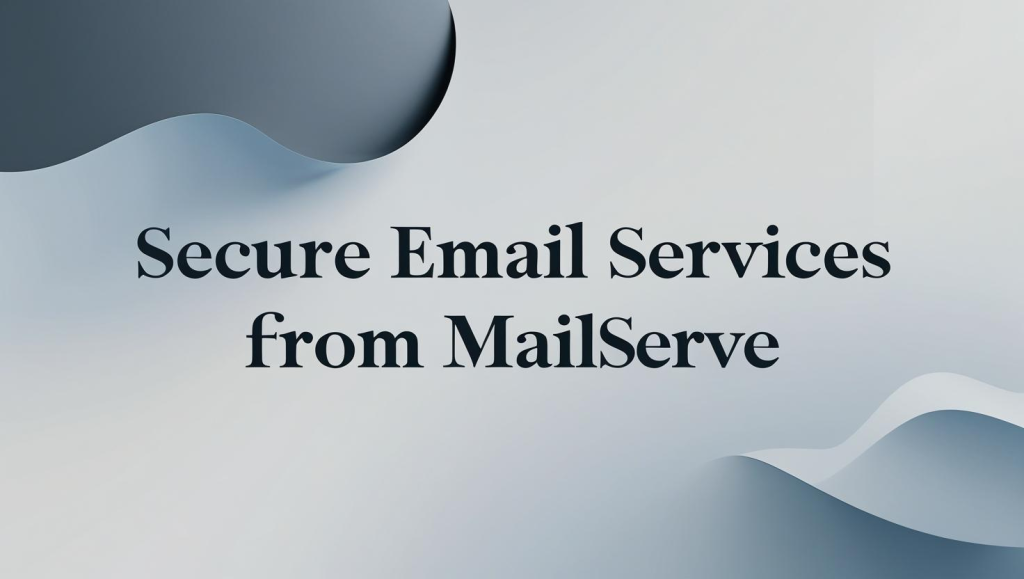
I’ve been tracking email hosting solutions in the Indian market for years, and recently I’ve noticed a significant trend: banking, financial services, and insurance (BFSI) companies are increasingly moving away from generic email providers toward specialised solutions like MailServe. After researching their platform and talking to their owners, I wanted to share what makes this Mumbai-based company stand out in the crowded email hosting space.
The Compliance Challenge That BFSI Companies Face
Let me start with the elephant in the room. If you work in banking or financial services in India, you know that email isn’t just about sending messages. Every communication you handle involves sensitive customer data, regulatory requirements, and compliance mandates that can make or break your business.
I’ve seen too many regional banks and NBFCs struggle with this. They start with popular email providers like Gmail or Outlook, thinking they’ll save money. But then compliance audits roll around, data localisation requirements kick in, and suddenly they’re scrambling to find solutions that actually meet RBI guidelines.
This is where MailServe seems to have found their niche. They’ve built their entire platform around the specific needs of Indian financial institutions.
What Sets MailServe Apart
Data Sovereignty Done Right
The biggest selling point I’ve observed is their “Made in India, Hosted in India” approach. All data stays within Indian borders, which isn’t just good marketing—it’s a compliance requirement for many BFSI companies. Their infrastructure runs entirely on Indian data centers, and they’ve structured their service to align with CERT-IN directives and NABARD requirements.
Enterprise-Grade Security Features
From what I can see, MailServe offers AES-256 encryption, multi-factor authentication, and real-time threat detection. These aren’t add-ons—they’re built into the core platform. They also provide detailed audit trails, which are crucial when regulators come knocking.
Scalability That Works
I’ve noticed they serve everyone from 50-employee cooperative banks to large regional banks with thousands of users. Their architecture uses grouped and distributed server clusters, which means you’re not paying enterprise prices for small-scale needs, but you can scale up without migrating to a different platform.
The Technical Infrastructure Behind MailServe
Here’s what I found interesting about their technical setup. MailServe supports all the standard protocols—IMAP, SMTP, POP3, and webmail access. Nothing groundbreaking there. But they’ve also built in some features that matter specifically to financial institutions:
- Custom domain integration that works even if your domain is hosted elsewhere
- Administrative controls that let IT teams manage mailbox quotas, routing rules, and email forwarding from a browser-based panel
- Mobile device support with ActiveSync for seamless calendar and contact synchronisation
- ISP independence through authenticated SMTP relays
Their support network spans over 50 locations across India, with dedicated offices in major cities like Mumbai, Delhi, Bangalore, and Chennai. For regional banks with branches across multiple states, having local support can be a game-changer.
Real-World Performance and Reliability
MailServe claims a 99.9% uptime SLA, which is standard for enterprise email hosting. What’s more impressive is their track record—they’ve been operating for over 20 years and currently manage email for more than 1,000 organisations globally.
I found customer testimonials mentioning cost reductions of up to 40% compared to maintaining an in-house email infrastructure. That’s significant when you’re talking about the total cost of ownership, including hardware, maintenance, and IT staff time.
Pricing and Value Proposition
I couldn’t find detailed pricing on their website, which suggests they offer customised quotes based on specific requirements. This approach makes sense for BFSI clients who often have unique compliance needs and varying user counts across multiple locations.
From what I can gather, they position themselves as a cost-effective alternative to maintaining on-premises email servers while offering more compliance features than generic cloud email providers.
Areas for Consideration
While researching MailServe, I noticed a few things that potential clients should consider:
Limited International Presence: If your organisation has significant operations outside India, its 50+ support locations are all within India and some Middle Eastern countries. This could be limiting for multinational financial institutions.
Customisation Requirements: Their focus on BFSI compliance means they might be overkill for simpler business needs. If you’re not dealing with regulatory requirements, you might find more straightforward solutions elsewhere.
Integration Dependencies: While they offer API access and integration capabilities, moving from existing email infrastructure always involves some migration complexity.
The Bottom Line for BFSI Companies
After researching MailServe’s offerings, I can see why Indian financial institutions are gravitating toward their platform. They’ve addressed the specific pain points that generic email providers often overlook—regulatory compliance, data sovereignty, and the need for reliable local support.
For cooperative banks, regional banks, and NBFCs dealing with regulatory pressure and the need to maintain customer trust, MailServe appears to offer a middle ground between expensive on-premises solutions and compliance-risky generic providers.
The 20+ years of experience in the Indian market also counts for something. They understand the regulatory landscape and have built their infrastructure to evolve with changing compliance requirements.
Ready to Evaluate Your Email Infrastructure?
If you’re working in the BFSI sector and struggling with email compliance, infrastructure costs, or reliability issues, it might be worth having a conversation with MailServe’s team. They offer free consultations where they can assess your specific requirements and demonstrate how their platform addresses common BFSI challenges.
You can reach out to them directly at [email protected] or request a demo through their website to see how their solution might fit your organisation’s needs.